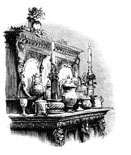
Incredible Shrinking Churches
For all Christian churches this is a time of big decisions. The decisions revolve around one fundamental question: Can we strike a balance between our tradition and the Zeitgeist, the spirit of the age? It’s a question with which all Christian bodies struggle, to varying extents. Some, like the Orthodox Church, answer no. Others, like the Presbyterian Church (U.S.A.), answer yes. And once an affirmative answer is given, policies must be put into place to reflect it.
And so it was that after decades of debate, PC(USA)’s 2010 General Assembly approved a proposal that would remove the requirement of either marital fidelity or single chastity the denomination imposes on its clergy. The requirement is coded in its constitution, The Book of Order, which states, “Those who are called to office in the church are to lead a life in obedience to Scripture and in conformity to the historic confessional standards of the church. Among these standards is the requirement to live either in fidelity within the covenant of marriage between a man and a woman, or chastity in singleness. Persons refusing to repent of any self-acknowledged practice which the confessions call sin shall not be ordained and/or installed as deacons, elders, or ministers of the Word and Sacrament.”
This spring a majority of PC(USA)’s regional presbyteriates voted to ratify the General Assembly’s proposal, in contravention of its constitution. The denomination’s new policy, which went into effect this summer, opens the door to the ordination of openly homosexual ministers.
This fall the first openly homosexual minister was ordained in PC(USA). On October 8, Scott Anderson, 56, received the pastor’s stole at Covenant Presbyterian Church in Madison, Wisconsin.
You May Also Enjoy
This is a tale of a well-organized and lofty effort by theologians, parish clergy, and laymen to recover the essence of Anglicanism in Canada.
Just when we were beginning to think that things couldn't get any more schizoid in the Anglican Communion, things are getting, well, more schizoid.
It behooves all of us, both clergy and laity, to recognize Modernism's subtle and not so subtle influence and counter it with prayer and adherence to sound doctrine.

